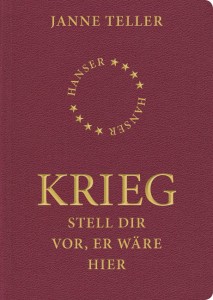During the week of October 21 to 27, 2013 the Academy of the Jewish Museum Berlin, in cooperation with Kulturkind e.V., will host readings, workshops, and an open day for the public with the theme “Multifaceted: a book week on diversity in children’s and young adult literature.” Employees of various departments have been vigorously reading, discussing, and preparing a selection of books for the occasion. Some of these books have already been introduced here over the course of the last weeks.

At a first glance, Janne Teller’s book looks like a passport – it’s just that small and, with just 32 pages, not much thicker. The text begins with a question: “If a war were to break out here. Where would you go?” I had never asked myself this question before. And yet, with her simple but poignant sentences Teller paints a powerful picture of a war in Germany, the flight of a family through a number of countries and their subsequent life in a refugee camp, as well as telling the story of a new generation growing up in Egypt.
Three years from today, a war. The European Union has collapsed. Germany refuses to continue to support it financially. People are being tortured and are disappearing. This Germany is a homeland destroyed. Teller writes about the 14-year-old protagonist using the second person narrative, and she means you – you, the reader. She’s telling a story about you. About your worries and fears. About your parents, your sisters, your brothers, your friends. About your life, the one that’s now out of your control.
“Where to go? There’s no answer. Your family has been reduced to a mere number. Five! There’s no country that wants to take in another five refugees. Refugees who haven’t mastered the language and who don’t know how to carry themselves in a society shaped by classical culture; who don’t understand that one should respect one’s neighbors, treat guests better than oneself, and venerate the honor of a woman.”
The refugees from Europe don’t speak the language, they can’t tolerate the heat, and they don’t show respect for others. They belong to a different culture. They are not welcome.
As I put the book down, I picked up a newspaper only to stumble across an article about a home for refugees here in Berlin: “Neighbors not welcome.” I wondered, how do people that we fail to welcome react to this? How would the knowledge that I am unwelcome affect my behavior? What would I do, if there were actually nothing I could do about it? For days on end. For nights on end. When my hope began to fade? When my life had been stolen from me?
The boy in the book thinks he’ll take up any work he can once he reaches safety. He wants to come to grips with his situation; he wants to forget, he wants to remember. He wants to begin a new life, to start a family, to have a future. He has dreams, and he believes that he can make them all come true…
Teller wrote the book in 2001 at a time when immigration laws were being toughened in her native Denmark (the book takes place in Denmark in the original Hvis der var krig i Norden (If Scandinavia Were at War)), and the tone of public discourse about immigrants was shifting. Ten years later the German publisher Carl Hanser brought out the book here, re-written to take place in Germany. Sadly, the text loses none of its relevance here today.
The illustrator Helle Vibeke Jensen draws, employing minimalistic lines, pictures of war, fear, destruction, violence, and helplessness. Creating the illusion of wallpaper, individual motifs are reproduced on the page multiple times . However, the depictions of Egypt are different: here, hazy photographs serve as the background to the illustrations. One can recognize people sitting, walking, and buying groceries. But the viewer can’t share in this suggested normalcy. The realism of these photographs is disturbed by drawings and signs in the foreground.
Definitely look up and read this book!
Nina Wilkens, Education
Janne Teller, Krieg. Stell dir vor, er wäre hier, translated from Danish into German by Sigrid Engeler, illustrations by Helle Vibeke Jensen, Munich: Carl Hanser Verlag 2011, 64 pages. (Recommended for children 12 years and up.)
P.S. I haven’t told the whole story: read it. It is very moving. So much so, that we left copies in mailboxes around Berlin. Janne Teller talks about it here (in German) on German cultural radio.
